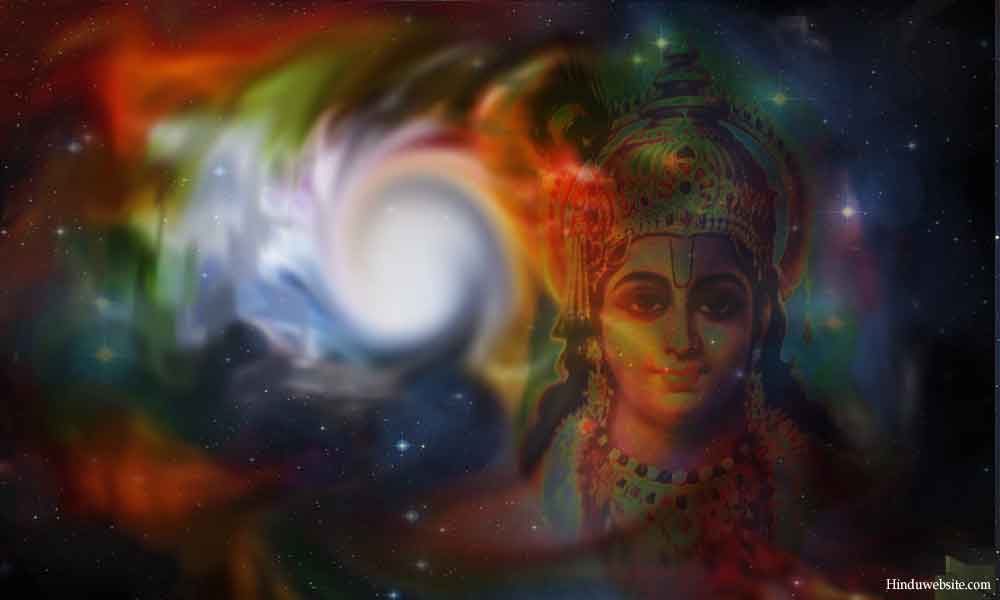
Introduction to Isa Upanishad

Isa or Isavasya Upanishad derives its name from the first word of the first verse of the same Upanishad. The word "Isa" means the Lord of the Universe. the Upanishad begins with the majestic and triumphant declaration that the whole universe is inhabited by God and belongs to Him. As the name suggests, Isa Upanishad is an Upanishad of Isa or Isvara, the Lord of Creation and the source of all.
The Upanishad contains some important concept of Hinduism which are also found in the Bhagavadgita. They are:
1. Living with awareness: We should live with the awareness that God is supreme and all pervading Lord and that we are part of His immense existence.
2. Desireless actions: Since God is the true Lord of the Universe and every movement (action) in the universe happens because of Him, we should perform our actions without desires and with deference to God.
3. Right living: We should be vary of actions that hurt us spiritually and lead us to the demonic worlds. In the Bhagavadgita Lord Krishna enumerates the demonic qualities that lead men to worlds of darkness.
4. Living for the Self. Live for the sake of the Self, which is transcendental, immortal and beyond the mind and the senses.
5. Cultivate discernment. We should have the discrimination to know both knowledge and ignorance, truth and untruth, the unmanifested and the manifest to attain eternal life.
The last three verses of the Upanishad evoke certain pathos as we read them. They deal with death and the departure of the soul from the body. They are chanted during the cremation ceremonies. These verses were probably used in the past in the final moments by Yogis and ascetics who willingly gave up their lives through yogi suspension of breath, self-immolation or intense starvation.
The Upanishad's approach to live and works is very emphatic. It gives a very convincing and logically acceptable argument as to why we should responsibly live in this world with divine centered attitude and perform our duties without any attachment and selfishness. The argument is simple. Since the whole world is inhabited by God and He is the dynamic force in all the dynamics of the universe, nothing belongs to us here and no action can be truly performed by us on our own.
To covet what does not belong to us and to assume the doership of what we really do not do are part of the delusion we all suffer from. Therefore, goes the argument, we should wish to live in this world for a hundred years, performing our duties, but without claiming any rights of ownership of either the deeds or of the things.
The Upanishad is the 40th chapter of the Vajasaneya Samhita of the Yajur Veda. Mahatma Gandhi extolled the spiritual message contained in the first verse of this Upanishad. Apart from other ideas he found in it, he was particularly impressed by its " message of universal brotherhood- not only brother hood of human beings but of all living things."
The following are few links available at Hinduwebsite.com regarding the Isa Upanishads and its teachings.
Suggestions for Further Reading
- The Isa Or Isavasya Upanishad, Translation and Commentary
- The Wisdom of the Isa Upanishad
- The Wisdom of the Isa Upanishad
- Isa Upanishad On The Importance Of Duty
- The Samkhya Philosophy and 24 Principles of Creation
- The Bhagavadgita On The Problem Of Sorrow
- The Concept of Atman or Eternal Soul in Hinduism
- The Practice of Atma Yoga Or The Yoga Of Self
- The Problem of Maya Or Illusion and How To Deal With It
- Belief In Atman, The Eternal Soul Or The Inner Self
- Brahman, The Highest God Of Hinduism
- The Bhagavad Gita Original Translations
- The Bhagavadgita, Philosophy and Concepts
- Bhakti yoga or the Yoga of Devotion
- Hinduism And The Evolution of Life And Consciousness
- Why to Study the Bhagavadgita Parts 1 to 4
- The Triple Gunas, Sattva, Rajas and Tamas
- The Practice of Tantra and Tantric Ritual in Hinduism and Buddhism
- The Tradition Of Gurus and Gurukulas in Hinduism
- Origin, Definition and Introduction to Hinduism
- Hinduism, Way of Life, Beliefs and Practices
- A Summary of the Bhagavadgita
- Avatar, the Reincarnation of God Upon Earth
- The Bhagavadgita on Karma, the Law of Actions
- The Mandukya Upanishad
- The Bhagavadgita On The Mind And Its Control
- Symbolic Significance of Numbers in Hinduism
- The Belief of Reincarnation of Soul in Hinduism
- The True Meaning Of Renunciation According To Hinduism
- The Symbolic Significance of Puja Or Worship In Hinduism
- Introduction to the Upanishads of Hinduism
- Origin, Principles, Practice and Types of Yoga
- Hinduism and the Belief in one God
- Essays On Dharma
- Esoteric Mystic Hinduism
- Introduction to Hinduism
- Hindu Way of Life
- Essays On Karma
- Hindu Rites and Rituals
- The Origin of The Sanskrit Language
- Symbolism in Hinduism
- Essays on The Upanishads
- Concepts of Hinduism
- Essays on Atman
- Hindu Festivals
- Spiritual Practice
- Right Living
- Yoga of Sorrow
- Happiness
- Mental Health
- Concepts of Buddhism
- General Essays